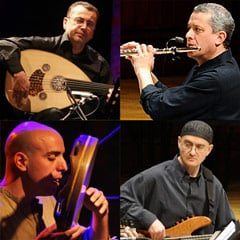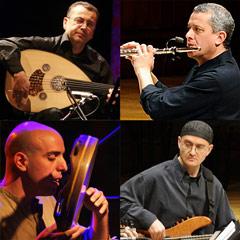
Many events are touted as a once-in-a-lifetime opportunity. Any performance by Israel’s Bustan Quartet provides such an opportunity. The quartet, a reunion of four members of the band Bustan Abraham, does not tour, so it’s a real honor for the Jewish Musical Festival to host it in the Bay Area. According to Ellie Shapiro, the Festival’s director, this unprecedented event is the result of a major collaboration between several departments at UC Berkeley.
Bustan Abraham is credited with bringing world attention to the music of Israel, and the group performs an astonishing mix of music from Israeli and Arabic classical traditions. It’s known for combining and grounding the two traditions to create new sounds. It also draws on Western resources, but gives the music its own unique twist. And while the group brings together two often-in-conflict traditions, it shies away from political discussions, preferring to let their music speak for itself.
Benjamin Brinner, a UC Berkeley ethnomusicologist and chair of the Music Department, is the author of the leading work about Bustan Abraham. He notes that Bustan’s music undergoes a group process of editing and orchestration, which provides added depth. Each piece supports improvised solos. And, finally, he remarks that “Bustan favors rhythmically complex pieces, many of which shift tempo and/or employ unusual meters.” There’s no doubt that this process will continue with this smaller quartet.
The musicians themselves are also highly trained and extremely versatile, moving between musical genres with ease. Taiseer Elias plays violin and oud. Brinner notes his ability to combine his acclaimed musicality in interpreting Arab art music with his training in Western classical music. The founder and conductor of the first Orchestra of Classical Arabic Music in Israel, Elias is currently the musical director and conductor of the Arab-Jewish orchestra and the Music Center in Jerusalem, as well as the head of Eastern Music Department at the Rubin Academy of Music, a professor in the Musicology Department at Bar Ilan University, and the director of Arab music education in Israel’s Education Ministry.
The other members of the ensemble are equally impressive. Amir Milstein, a classically trained flutist on the world-music scene, also plays jazz and Latin American repertoires; when not performing, he teaches and conducts workshops and clinics. Emmanuel Mann, who is one of Israel’s top bass players, played funk music in Paris, then moved to Israel where he experimented with Middle Eastern–tinged fusion; today, he performs around the world and leads workshops. The fourth member, Zohlar Fresco, is a world-renowned percussionist who is considered a virtuoso on both Oriental and Western instruments and has developed his own unique finger style.
Yet perhaps the best description of the music and the group comes from Festival director Shapiro: “I lived in Israel for nine years and don’t know of any other group with such a deeply engaging interpretation. They create music with a profound message.”
You’ll have two chances to hear the Bustan Quartet. The first performance will be on Thursday, March 22, at 7:00 p.m. at the Magnes Collection of Jewish Art and Life, 2121 Allston Way, Berkeley. The second performance will be on Sunday, March 25, at 7:30 p.m. at Congregation Sherith Israel in San Francisco.

